Fair Isaac Bundle
Can Fair Isaac Company Maintain Its Dominance in the Age of AI?
Fair Isaac Company, the name behind the ubiquitous FICO Score, has long been a cornerstone of the financial world. From its inception in 1956, FICO has transformed how we understand and manage credit risk. Today, as the financial landscape rapidly evolves, understanding the Fair Isaac SWOT Analysis is crucial to anticipate the company's next moves.
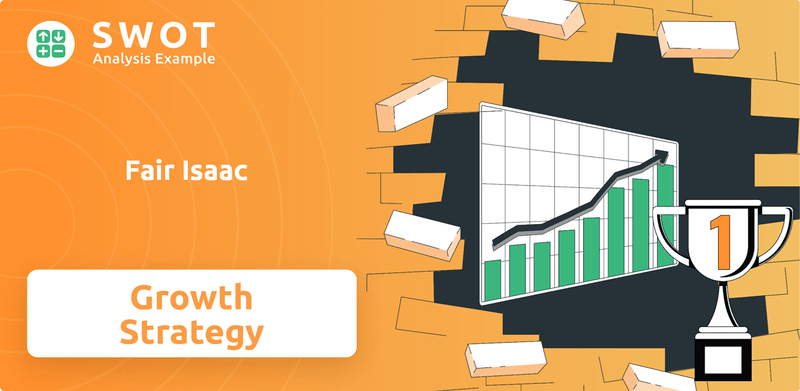
This article delves into the intricate Growth Strategy of Fair Isaac Company, exploring its evolution from a credit scoring pioneer to a leader in financial analytics. We'll examine FICO's current market position, its plans for expansion, and its strategic focus on innovation and technology. Furthermore, we will analyze the potential risks and opportunities shaping the FICO's future outlook in the dynamic world of credit scoring and financial analytics.
How Is Fair Isaac Expanding Its Reach?
The Fair Isaac Company's (FICO) expansion strategy is focused on increasing its market presence in existing sectors and exploring new geographical and product categories. A key part of this involves expanding in international markets, particularly in areas with developing credit infrastructures. This approach includes adapting its core FICO Score and related analytics solutions to meet the specific demands of different countries.
FICO is actively working with financial institutions worldwide to implement and adjust its scoring models. This helps to foster financial inclusion and improve lending practices globally. Their strategy also includes continuous enhancement of its analytics software and tools, going beyond traditional credit scoring to include fraud detection, compliance, and customer lifecycle management solutions.
A significant part of this expansion involves cloud-based offerings and Software-as-a-Service (SaaS) models, allowing for greater scalability and accessibility of their products. For example, FICO's decision management suite aims to provide a comprehensive platform for businesses to make data-driven decisions across various operational areas. Strategic partnerships are also crucial for expanding FICO's reach and integrating its solutions into broader ecosystems. These collaborations enable FICO to access new customer segments and diversify its revenue streams, staying ahead of evolving industry needs and competitive pressures.
FICO is targeting growth in international markets, particularly those with emerging credit infrastructures. This involves tailoring its FICO Score and analytics to meet local regulatory and market needs. The company is actively collaborating with financial institutions in various countries to implement and adapt its scoring models.
Beyond traditional credit scoring, FICO is expanding its product offerings to include fraud detection, compliance, and customer lifecycle management solutions. The company is focusing on cloud-based and SaaS models to increase product scalability and accessibility. FICO's decision management suite provides a comprehensive platform for data-driven business decisions.
FICO is investing in technological advancements to enhance its offerings. This includes the development of advanced analytics tools and the integration of artificial intelligence (AI) and machine learning (ML) to improve the accuracy and efficiency of its solutions. These advancements help in better credit risk management.
Strategic partnerships are crucial for FICO's expansion. These collaborations help the company access new customer segments and integrate its solutions into broader ecosystems. Partnerships with fintech companies and data providers are key to expanding FICO's reach and staying competitive. These partnerships can also help to improve the FICO Score.
FICO's expansion strategy focuses on international growth, product diversification, technological advancements, and strategic partnerships. These initiatives are designed to increase market penetration and revenue streams. By focusing on these areas, FICO aims to strengthen its position in the financial analytics market.
- Expanding into emerging markets with tailored solutions.
- Developing advanced analytics tools for fraud detection and compliance.
- Leveraging cloud-based and SaaS models for greater scalability.
- Forming strategic partnerships to broaden market reach.
Fair Isaac SWOT Analysis
- Complete SWOT Breakdown
- Fully Customizable
- Editable in Excel & Word
- Professional Formatting
- Investor-Ready Format
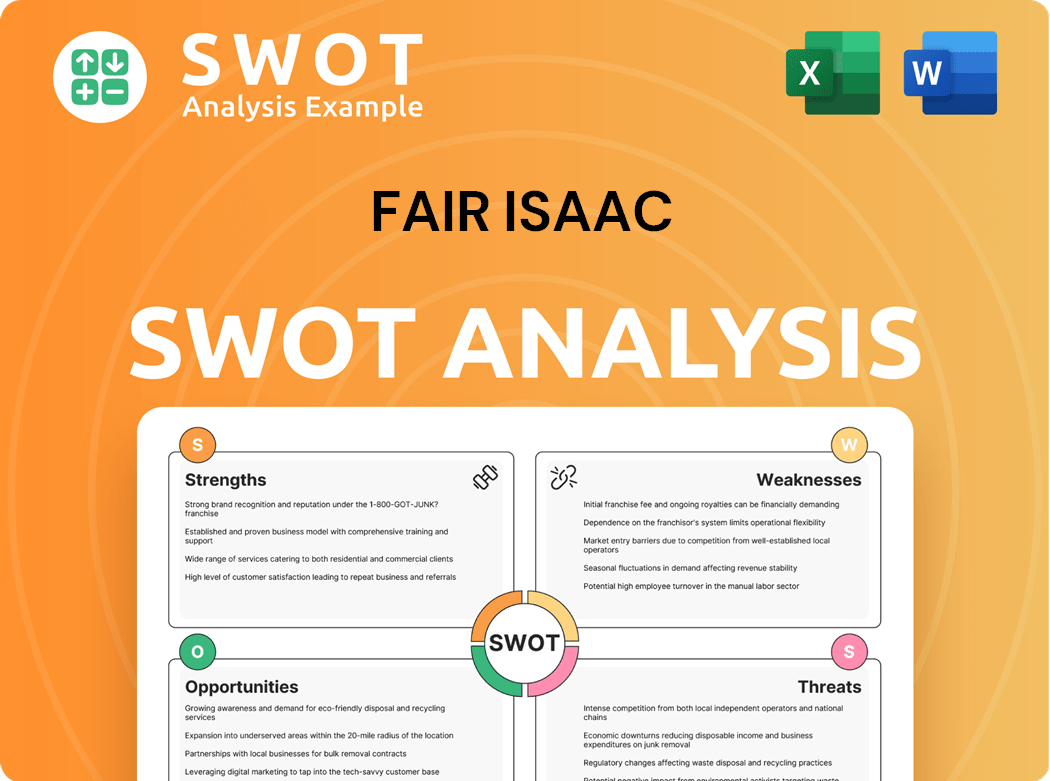
How Does Fair Isaac Invest in Innovation?
The innovation and technology strategy of the company, often referred to as FICO, is a cornerstone of its sustained growth. This strategy is built upon leveraging advanced analytics, artificial intelligence (AI), and cloud-based platforms. The company's commitment to research and development (R&D) is a key driver, leading to continuous improvements in its core offerings and the development of new solutions.
This commitment is evident in the continuous refinement of the FICO Score, incorporating new data sources and advanced machine learning techniques. The goal is to enhance predictive accuracy and fairness. The focus on in-house development of analytics software ensures proprietary control over its core intellectual property, which is crucial for maintaining a competitive edge in the financial analytics market.
A major aspect of the company's technological approach involves digital transformation and automation, both internally and for its clients. They are at the forefront of applying AI and machine learning to complex issues like fraud detection, credit risk assessment, and personalized customer engagement. For instance, the company's fraud detection solutions use advanced AI algorithms to identify anomalies in real-time, which offers substantial value to financial institutions.
The company's AI-driven fraud detection solutions are designed to identify and prevent fraudulent transactions in real-time. These solutions use advanced AI algorithms to analyze transactions, detecting anomalies and suspicious activities. This proactive approach helps financial institutions minimize losses and protect their customers from financial fraud.
The company is expanding its cloud-native capabilities, making its analytics platforms more accessible and scalable. This strategic shift allows clients to rapidly integrate the company's solutions, reducing implementation times and operational costs. Cloud-based deployments offer flexibility and efficiency, enabling businesses of all sizes to leverage the company's powerful analytics.
The company consistently invests in research and development (R&D) to enhance its core offerings and develop new solutions. This commitment to innovation is evident in the continuous refinement of the FICO Score through the incorporation of new data sources and advanced machine learning techniques. The company's R&D efforts are crucial for maintaining its competitive edge and driving future growth.
The company focuses on in-house development of its analytics software, ensuring proprietary control over its core intellectual property. This approach allows the company to maintain a competitive advantage by protecting its innovative technologies and algorithms. Proprietary control is essential for the company's long-term growth strategy.
The company has been involved in strategic partnerships to enhance its market reach and technological capabilities. These collaborations help the company integrate its solutions with other platforms and services, providing more comprehensive offerings to its clients. Strategic partnerships are a key component of the company's growth strategy.
The company is dedicated to continuous improvement in its products and services. This includes regularly updating the FICO Score with new data and advanced machine learning models to improve accuracy and fairness. Continuous improvement is essential for maintaining its leadership position in the credit scoring industry.
The company's dedication to innovation is further underscored by its numerous patents in analytical methods and decision management technologies, solidifying its leadership in the industry. The company's commitment to innovation and technology is a key driver of its Growth Strategy, enabling it to stay ahead in the competitive financial analytics market.
The company's technological advancements are focused on enhancing its core offerings and developing new solutions. These advancements are critical for maintaining its competitive edge and driving future growth. The company's investments in AI, cloud computing, and data analytics are central to its technological strategy.
- AI and Machine Learning: The company leverages AI and machine learning to improve its credit scoring models and fraud detection systems. In 2024, the company continued to refine its AI algorithms to enhance predictive accuracy and fairness in credit scoring.
- Cloud-Based Platforms: The company is expanding its cloud-native capabilities to make its analytics platforms more accessible and scalable. This shift allows clients to rapidly integrate its solutions, reducing implementation times and operational costs. The company's cloud-based offerings are designed to provide flexibility and efficiency for businesses of all sizes.
- Data Analytics: The company utilizes advanced data analytics to provide insights and solutions for its clients. This includes analyzing large datasets to identify trends, assess risks, and make informed decisions. The company's data analytics capabilities are essential for its growth strategy.
- Continuous Innovation: The company is committed to continuous innovation in its products and services. This includes regularly updating the FICO Score with new data and advanced machine learning models to improve accuracy and fairness. The company's innovation efforts are crucial for maintaining its leadership position in the credit scoring industry.
Fair Isaac PESTLE Analysis
- Covers All 6 PESTLE Categories
- No Research Needed – Save Hours of Work
- Built by Experts, Trusted by Consultants
- Instant Download, Ready to Use
- 100% Editable, Fully Customizable
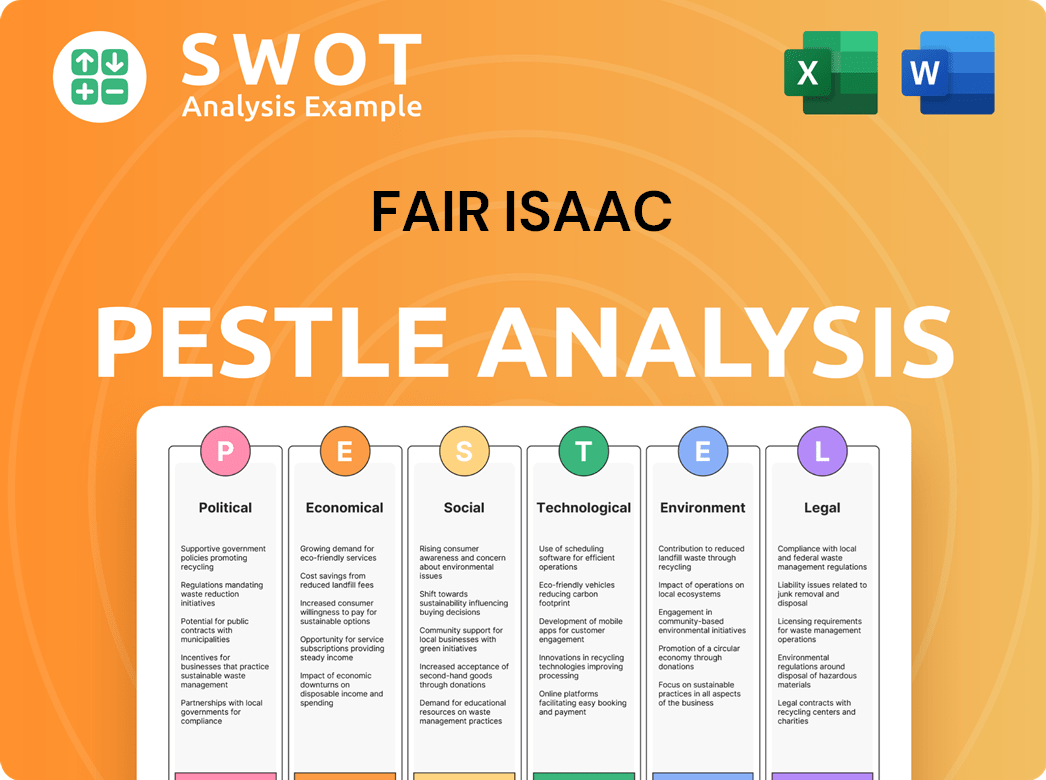
What Is Fair Isaac’s Growth Forecast?
The financial outlook for Fair Isaac Company (FICO) remains robust, driven by the consistent demand for its credit scoring and analytics solutions. The company's financial performance underscores its strong position in the market. The Marketing Strategy of Fair Isaac has been instrumental in driving this financial success.
FICO's financial health is supported by the essential nature of the FICO Score in lending decisions and the increasing adoption of its broader software offerings for risk management and fraud detection. The company's ability to generate strong cash flow allows it to invest in growth initiatives and return value to shareholders. This financial stability is a key factor in its long-term growth strategy.
FICO reported an increase in its scores segment revenue by 8% to $209 million in the second fiscal quarter of 2024, compared to the prior year period. The software segment revenue also saw a significant increase of 14% to $240 million in the same quarter, demonstrating the company's ability to expand its market presence and product offerings.
FICO's revenue growth is consistently positive, reflecting the strong demand for its products and services. The company's ability to maintain and expand its revenue streams is a key indicator of its financial health.
Analyst forecasts generally project healthy profit margins for FICO, supported by the recurring revenue nature of its core business. This profitability allows the company to invest in innovation and strategic initiatives.
FICO's substantial investment in research and development supports its innovation strategy. These investments ensure the company maintains its competitive edge in the market. This is crucial for long-term growth.
FICO's long-term financial goals include expanding its global footprint. This expansion will diversify revenue streams through new product development and strategic partnerships. This is a key part of its growth strategy.
The recurring revenue model of FICO's core business provides a stable financial foundation. This stability supports consistent revenue streams and predictable financial performance. The high switching costs for clients also contribute to this stability.
FICO's strong cash flow generation enables investments in growth initiatives. This strong cash position allows for strategic investments and shareholder value creation. This is a key aspect of the company's financial strategy.
Strategic partnerships are a key component of FICO's growth strategy. These partnerships help to diversify revenue streams and expand market reach. They also provide access to new technologies and markets.
New product development is essential for FICO's long-term growth. The company focuses on innovation to meet evolving market needs. This includes advancements in credit scoring and financial analytics.
FICO maintains a significant market share in the credit scoring and financial analytics sectors. This strong market position is a key factor in its financial success. The company's competitive advantage is a key factor.
FICO operates in a competitive landscape, but its established brand and innovative solutions provide a strong advantage. The company's focus on technology advancements helps it to stay ahead. This is a key aspect of its market strategy.
Fair Isaac Business Model Canvas
- Complete 9-Block Business Model Canvas
- Effortlessly Communicate Your Business Strategy
- Investor-Ready BMC Format
- 100% Editable and Customizable
- Clear and Structured Layout
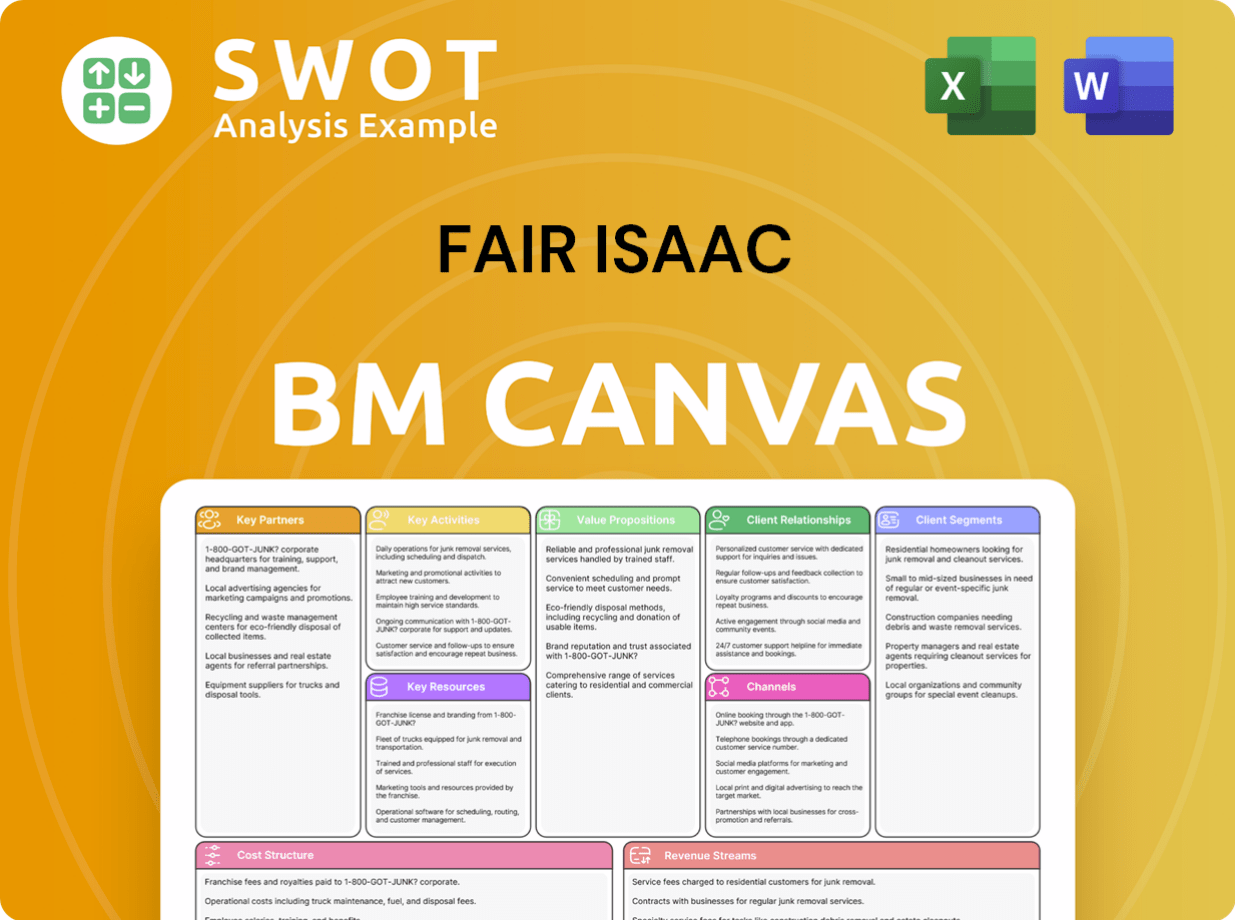
What Risks Could Slow Fair Isaac’s Growth?
The path to growth for Fair Isaac Company (FICO) is not without its challenges. Several potential risks and obstacles could impact its future. Understanding these challenges is crucial for assessing the company's long-term prospects and its ability to maintain its leadership in the financial analytics sector. These factors include market competition, regulatory changes, and technological disruptions.
Market competition is a significant factor. The emergence of alternative scoring models and data-driven solutions from competitors poses a threat to FICO's market share. Regulatory changes, particularly in data privacy and consumer protection, also present notable risks. Furthermore, rapid advancements in AI and alternative data sources require continuous investment and adaptation.
The company's ability to navigate these challenges will determine its success. FICO's strategic responses to these risks, including product innovation, regulatory engagement, and risk management, are critical. The company's diversification across industries and geographies also plays a crucial role in mitigating reliance on any single market or product. The company's ability to adapt to evolving consumer demands and technological advancements will be key to its future growth.
The Competitors Landscape of Fair Isaac includes numerous analytics providers and fintech companies. These competitors offer alternative credit scoring models, potentially eroding FICO's market share, especially in the long run. The competitive pressure may also affect pricing strategies.
Evolving data privacy laws and consumer protection regulations pose a significant risk to FICO. Changes in antitrust scrutiny in various jurisdictions could affect its business practices. These regulations could impact how FICO collects and uses data, as well as the products it can offer.
Rapid advancements in AI, blockchain, and alternative data sources could necessitate continuous and substantial R&D investments. FICO must stay ahead of these technological shifts to maintain its competitive advantage. Failure to adapt could lead to a loss of market share.
Attracting and retaining top talent in data science and AI is crucial for FICO's development. Internal resource constraints, such as the availability of skilled personnel, could hinder the company's expansion efforts. This is particularly important in the fast-paced technological environment.
The increasing focus on explainable AI and ethical AI practices will shape FICO's future trajectory. The company must carefully consider these aspects in its product development and deployment. Failure to address these concerns could damage its reputation and market position.
Reliance on specific geographic markets or industries can create vulnerabilities. Economic downturns or regulatory changes in key markets could significantly impact FICO's revenue. Diversification is a key strategy to mitigate these risks.
FICO employs several strategies to mitigate these risks. Continuous product innovation is essential to stay ahead of competitors. Active engagement with regulatory bodies helps the company navigate changing regulations. A robust risk management framework is also crucial for managing various challenges.
Diversifying offerings across different industries and geographies is a key strategy. This reduces reliance on any single market or product. For instance, the company has adapted its scoring models to changes in credit reporting practices. This diversification helps to stabilize revenue streams.
Fair Isaac Porter's Five Forces Analysis
- Covers All 5 Competitive Forces in Detail
- Structured for Consultants, Students, and Founders
- 100% Editable in Microsoft Word & Excel
- Instant Digital Download – Use Immediately
- Compatible with Mac & PC – Fully Unlocked
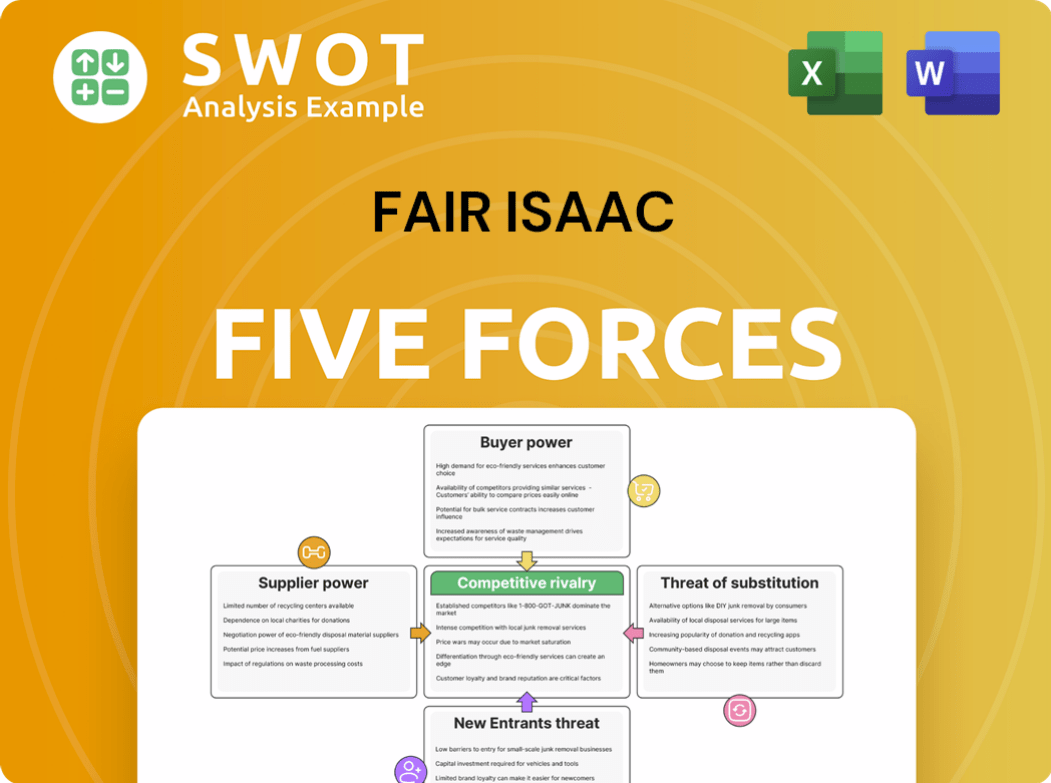
Related Blogs
- What are Mission Vision & Core Values of Fair Isaac Company?
- What is Competitive Landscape of Fair Isaac Company?
- How Does Fair Isaac Company Work?
- What is Sales and Marketing Strategy of Fair Isaac Company?
- What is Brief History of Fair Isaac Company?
- Who Owns Fair Isaac Company?
- What is Customer Demographics and Target Market of Fair Isaac Company?
Disclaimer
All information, articles, and product details provided on this website are for general informational and educational purposes only. We do not claim any ownership over, nor do we intend to infringe upon, any trademarks, copyrights, logos, brand names, or other intellectual property mentioned or depicted on this site. Such intellectual property remains the property of its respective owners, and any references here are made solely for identification or informational purposes, without implying any affiliation, endorsement, or partnership.
We make no representations or warranties, express or implied, regarding the accuracy, completeness, or suitability of any content or products presented. Nothing on this website should be construed as legal, tax, investment, financial, medical, or other professional advice. In addition, no part of this site—including articles or product references—constitutes a solicitation, recommendation, endorsement, advertisement, or offer to buy or sell any securities, franchises, or other financial instruments, particularly in jurisdictions where such activity would be unlawful.
All content is of a general nature and may not address the specific circumstances of any individual or entity. It is not a substitute for professional advice or services. Any actions you take based on the information provided here are strictly at your own risk. You accept full responsibility for any decisions or outcomes arising from your use of this website and agree to release us from any liability in connection with your use of, or reliance upon, the content or products found herein.